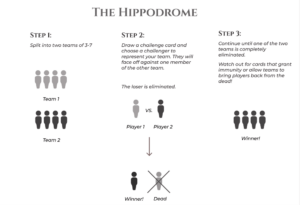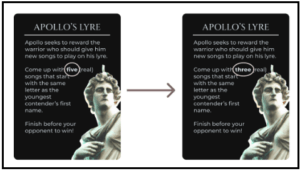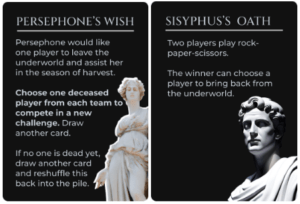P1-26 (Eli Waldman, Defne Genç, Pedro Civita)
Artist’s Statement
Welcome… to THE HIPPODROME. Hippodromes are ancient Greek arenas where audiences would watch dramatic– and often dangerous– spectacles: chariot races, gladiator matches, animal fights, etc. Being avid fans of Greek myth, Defne, Pedro and Eli wanted to make a game that thematically engages with Greek mythology and contains a consistent, dramatic, and engaging narrative supported by appealing gameplay and visual design.
Defne, Pedro and Eli have enjoyed team games for as long as they can remember. But one problem that frequently arises in team games is that not every team member pulls their fair share, i.e. weaker links are saved by stronger ones. Enter: THE HIPPODROME. THE HIPPODROME meshes together the best forms of team play with tricky individual challenges! Leaning on your team can only get you so far, as each team elects one champion to compete in every round. You can’t be a weak link in this hippodrome, every player must pull their weight.
There were several decisions that led to the way we structured the game. These decisions were that:
- We wanted a game that could be played in party settings, or with many people.
- The game would be playable with strangers without being awkward.
- The game involved two teams facing off.
- The format would be 1-v-1 at all times, with other teammates cheering the competing team member on (like flip cup).
- The game would have an interesting theme to make it engaging.
Rules
click here to watch rule video!
Concept Map (click here for higher quality image)

Formal Elements
From those initial decisions, we came up with the formal elements of the game. First of all, we established that teams would be central to the game. This is also how we structured the rules. We have two teams where each team must pick a champion to complete in whatever challenge card is drawn. This mechanic is the driving force of the game– players must think carefully about who they nominate, as this also adds the risk of that player getting eliminated. Strategy plays a strong role here, as a team may want one specific member to be left as their last player.
Elimination is also a central mechanic to the game, as that is how the game is one. Card-drawing and champion-nominating are also central mechanics as this is what keeps the game going. The Hippodrome theme is also one of the formal elements which distinguishes this game from others of its kind, presenting the challenges as fun, fantasy-like requests from the Gods of Olympus themselves.
Types of Fun
Our game relies heavily on strategy, challenge, and fellowship, also allowing for discourse. We added the ability for teams to pick who represented them for each challenge, meaning we add an element of strategy and discourse to the game. This also meant that players would have to gauge and talk about what their teammates are good at, introducing some camaraderie and a fun getting-to-know-you element.
Fantasy is also present, with the cards representing challenges given by Greek gods or mythological figures, although it doesn’t take up too much of players’ attention. The challenges themselves are what introduce challenge as a type of fun, since they’re meant to be lighthearted with the added pressure of performing better than the people they are competing against.
Values of the game
This game is meant to be versatile– it can be played with friends, acquaintances, or even strangers. We also wanted players the flexibility to add drinking to it, though we don’t strongly imply it in the rules and want players to be able to make those mods themselves.
Forming teams and nominating champions means that teams will have to think critically about each individual player’s strengths and weaknesses while also lending to the fast pace of the game. We designed this dynamic to encourage players to get to know each other in a light-hearted manner if they are indeed strangers, or to be able to quickly nominate champions and get really competitive if they are already friends.
We wanted to make it so there’s a challenge for everyone, so whether it relies on memory, wit, speed, strength, or even sheer luck, we tried to cover all bases and create a well-rounded experience with the variety in our challenges.
Testing and Iteration History
Pluto Playtest
One of our biggest iterations came after TA Amy’s Pluto Game Night (Friday week 3). Eli went to Amy’s game night in Pluto to test two main questions:
- How does the game work among a group of people that don’t know each other well (non friends)
- Which mini games to people like/dislike?
Here were our big findings. Our game does work with groups of people that don’t know each other prior to playing. We had six total players (two teams of three) and saw that the mini games bonded them through challenge/competition. Tons of “game sounds” came out of this play test. People were excited and remained competitive throughout. One thing I saw that I loved was towards the end of the play test. Team A had 1 player alive, team B had all 3 alive. It was a last stand moment for the remaining player on team A. There was a ton of rallying around team A’s final player from his deceased teammates. Seeing that the “dead” players were still engaged and hyping up their final teammate was great, especially with a group of non-friends/strangers.
All of the mini games that were played (Sappho, Medusa, Ares, Hephaestus, etc.) went well and worked well in this setting, except for Oedipus and Apollo. For Oedipus, there was a ton of confusion around how this one should be played. The challenger for team B ended up just drawing a circle. This, of course, was very easy to guess and ended the game immediately and brought up a ton of discourse in the group around what counts as a “real” subject to draw. After this play test, we decided to change this challenge so that both challengers decide (without anyone else on either team knowing) what to draw. This way, they both are drawing the same thing and there is no resulting controversy. For Apollo, this challenge took way too long. Both players had a hard enough time coming up with three songs, so we decided to cut it from five songs to three songs. We tested this one a few times after and saw that the three songs worked way better and had a lot better flow to the game.
 (click here for higher quality image)
(click here for higher quality image)
Week 4.1 Play Test (final in class)
Click here to watch our final play test (START AT TIME STAMP 0:12)
This is a great example from the final play test of what happened when a card(s) was a little complicated. Players consult the instructions, then perform the required challenge. Reactions were great! The winning team celebrates and cheers! Fun is had! Some cards are complicated, and it can become even more complicated when buff/perk cards stack on each other. So, to fix the confusion, we edited our rules card and made it a lot more lenient and clear. We give the players more freedom to decide on “house rules” if they are confused or stuck on a concept (we want this game to be fast-paced!).
During this Week 4 Play test, we were able to test the game on two teams of four. The teammates did not know each other very well and the testing occurred in a loud and chaotic environment, so this was a good stress test for The Hippodrome.
We had an even number of men and women, which is what we were aiming for. One team was dominantly men, but it was the team that had more women who ended up winning despite the abundance of physical challenges in the game, showing that it did not necessarily give them an unfair advantage. This was one of the parts of the game we wanted to make sure was accessible and equitable for everyone.
During the game, we found that we needed to moderate, do countdowns, and read the cards out loud for everyone to understand the nature of each challenge. For this, we decided to designate one person to take on this role in the rulebook moving forward. Our current solution is to tell players that the first person who dies has the moderator role, with other dead players taking it on should the moderator come back to life.
We also prepared the large cups of water and pen and pencil in case players needed it. To ensure that this goes smoothly during real-life gameplay, we decided to add a “Setup” section to our rules. In the rules, we also decided to tell players that in the case where there are no dead players when a card calls for it, they have to shuffle it back into the deck.
Finally, the piece of advice we most overwhelmingly received was that players should be able to bring back dead teammates on more occasions. We had some players eliminated early on who weren’t brought back, which also informed the changes we made.
Play testing also allowed us to gain insight into our individual mini-games. The mini-games we decided to change were:
- Atlas’s Resilience: We noticed that it was too easy for someone to hold up their teammate while standing still. Having them race around the room while piggybacking could make for a more interesting challenge. We additionally thought to have the card state that players must carry a deceased teammate, bringing them back to life if they win. This is to give teams as many shots at bringing back players as possible.
- Apollo’s Lyre: The players may be able to deduce what letter they’re meant to guess song names with based on the other team. We therefore changed the card to tell players to name three songs starting with the first letter of the other player’s mother’s name. In this version, players will likely have different letters to name songs with.
- Zeus’s Reckoning: There was confusion on whether the same person would always be trying to slap the other. We therefore made it clear that they have to alternate.
- Song of Sappho: We changed the card to say “exact rhyme” meaning that only one sound can vary, since there are second-degree rhymes that may cause ambiguity. This did cause some confusion during our play testing.
- Oracle of Delphi: This was an experimental card where players would have to close their eyes and “palm read” for another player, meaning they felt their hand and tried to guess who they were. The players immediately found this weird and seemed reluctant to do it, so we scrapped the card entirely.
As for cards we decided to add, we have:
- A duplicate for Persephone’s Wish. This card allows dead players to compete for a chance to come back from the dead, which introduces a fun and unexpected dynamic. Giving teams this opportunity more than once may ensure that the game is more balanced (especially if one team has no players dead).
- Another chance-like game that allows players to bring someone back from the dead. We added a card that allows players to play rock-paper-scissors in order to bring someone back. We called this card Sisyphus’s Oath.
 (click here for higher quality image)
(click here for higher quality image)
Link to Working Version of Game
Click here for a link to our Figma.



